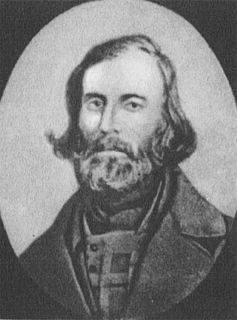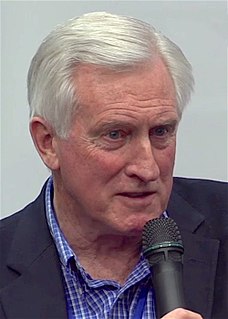A Quote by William Godwin
We are so curiously made that one atom put in the wrong place in our original structure will often make us unhappy for life.
Related Quotes
The story is told of Lord Kelvin, a famous Scotch physicist of the last century, that after he had given a lecture on atoms and molecules, one of his students came to him with the question, "Professor, what is your idea of the structure of the atom." "What," said Kelvin, "The structure of the atom? Why, don't you know, the very word 'atom' means the thing that can't be cut. How then can it have a structure?" "That," remarked the facetious young man, "shows the disadvantage of knowing Greek."
God is in the business of strategically positioning us in the right place at the right time. A sense of destiny is our birthright as followers of Christ. God is awfully good at getting us where He wants us to go. But here’s the catch: The right place often seems like the wrong place, and the right time often seems like the wrong time.
Mistakes are at the very base of human thought, embedded there, feeding the structure like root nodules. If we were not provided with the knack for being wrong, we could never get anything useful done. We think our way along by choosing between right and wrong alternatives, and the wrong choices have to be made as often as the right ones. We get along in life this way.
But that Franklin trip changed me profoundly. As I believe wilderness experience changes everyone. Because it puts us in our place. The human place, which our species inhabited for most of its evolutionary life. That place that shaped our psyches and made us who we are. The place where nature is big and we are small.
A label is a mask life wears. We put labels on life all the time. 'Right,' 'wrong,' 'success,' 'failure,' . . . Labeling sets up an expectation of life that is often so compelling we can no longer see things as they really are. This expectation often gives us a false sense of familiarity toward something that is really new and unprecedented. We are in relationship with our expectations and not with life itself.
There is a kind of structure for a story that was peculiarly compelling for the radio. I thought I had invented it atom-by-atom sitting in an editing booth in Washington on M Street when I was in my 20s. Then I found out that it is one of the oldest forms of telling a story - it was the structure of a sermon.
We are here to learn lessons and our birth chart tells us what our lessons are, what type of energy we possess in the first place, and how, by facing up to the challenges presented to us in life, spiritual growth will ensue. The birth chart is a 'tool' to guide us through our life. By understanding our basic make up, we can learn to make the most out of our positive points and try to improve on our weaker ones.
When life does not go our way or we inadvertently make a mistake, it is so easy to make excuses, place blame on others, or argue that circumstances were against us. But we only progress in life to the extent that we take responsibility for our actions and attitudes, and put forth the initiative necessary to create our own circumstances.
Who can break the law? If I break this glass, it will fall down. If anyone succeeds in throwing one atom out of place, every other atom will go out of balance. . . . The law can never be broken. Each atom is kept in its place. Each is weighed and measured and fulfils its [purpose] and place. Through His command the winds blow, the sun shines. Through His rule the worlds are kept in place. Through His orders death is sporting upon the earth. Just think of two or three Gods having a wrestling match in this world! It cannot be.
All the green in the planted world consists of these whole, rounded chloroplasts wending their ways in water. If you analyze a molecule of chlorophyll itself, what you get is one hundred thirty-six atoms of hydrogen, carbon, oxygen, and nitrogen arranged in an exact and complex relationship around a central ring. At the ring's center is a single atom of magnesium. Now: If you remove the atom of magnesium and in its exact place put an atom of iron, you get a molecule of hemoglobin. The iron atom combines with all the other atoms to make red blood, the streaming red dots in the goldfish's tail.
Until we stop ourselves or, more often, have been stopped, we hope to put certain of life's events "behind us" and get on with our living. After we stop we see that certain of life's issues will be with us for as long as we live. We will pass through them again and again, each time with a new story, each time with a greater understanding, until they become indistinguishable from our blessings and our wisdom. It's the way life teaches us to live.






































